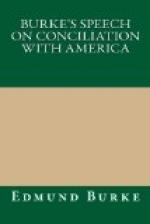The chief characteristics, then, of Burke’s political philosophy are opposed to much that is fundamental in modern systems. His doctrine is better than that of George iii, because it is more generous, and affords opportunity for superficial readjustment and adaptation. It is this last, or rather the proof it gives of his insight, that has secured Burke so high a place among English statesmen.
A GROUP OF WRITERS COMING IMMEDIATELY BEFORE BURKE
Addison. . . . 1672-1719
Steele . . . . 1672-1729
Defoe. . . . . 1661-1731
Swift. . . . . 1667-1745
Pope . . . . . 1688-1744
Richardson . . 1689-1761
A GROUP OF WRITERS CONTEMPORARY WITH BURKE
Johnson . . . . 1709-1784
Goldsmith . . . 1728-1774
Fielding. . . . 1707-1754
Sterne. . . . . 1713-1768
Smollett. . . . 1721-1771
Gray. . . . . . 1716-1771
Boswell . . . . 1740-1795
BURKE IN LITERATURE
It has become almost trite to speak of the breadth of Burke’s sympathies. We should examine the statement, however, and understand its significance and see its justice. While he must always be regarded first as a statesman of one of the highest types, he had other interests than those directly suggested by his office, and in one of these, at least, he affords an interesting and profitable study.
To the student of literature Burke’s name must always suggest that of Johnson and Goldsmith. It was eight years after Burke’s first appearance as an author, that the famous Literary Club was formed. At first it was the intention to limit the club to a membership of nine, and for a time this was adhered to. The original members were Johnson, Burke, Goldsmith, Reynolds, and Hawkins. Garrick, Pox, and Boswell came in later. Macaulay declares that the influence of the club was so great that its verdict made and unmade reputations; but the thing most interesting to us does not lie in the consideration of such literary dictatorship. To Boswell we owe a biography of Johnson which has immortalized its subject, and shed lustre upon all associated with him. The literary history of the last third of the eighteenth century, with Johnson as a central figure, is told nowhere else with such accuracy, or with better effect.
Although a Tory, Johnson was a great one, and his lasting friendship for Burke is an enduring evidence of his generosity and great-mindedness. For twenty years, and longer, they were eminent men in opposing parties, yet their mutual respect and admiration continued to the last. To Burke, Johnson was a writer of “eminent literary merit” and entitled to a pension “solely on that account.” To Johnson, Burke was the greatest man of his age, wrong politically, to be sure, yet the only one “whose common conversation corresponded to the general fame which he had in the world”—the only one “who was ready, whatever subject was chosen, to meet you on your own ground.” Here and there in the Life are allusions to Burke, and admirable estimates of his many-sided character.




